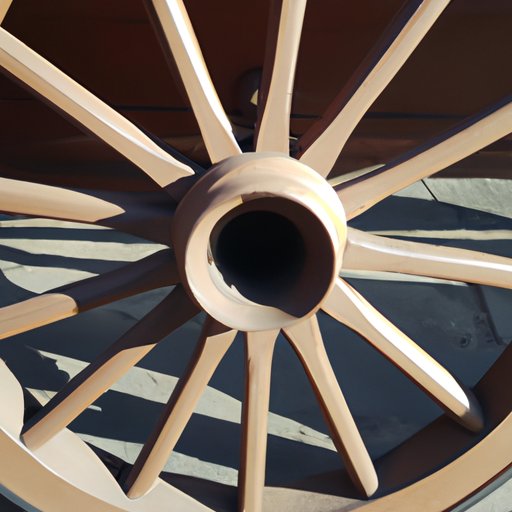
Introduction: A Brief Overview of the Wheel and Its Origins
The wheel is one of the most iconic inventions in human history, having been around for thousands of years and having played a crucial role in the development of civilizations across the globe. But how did the wheel come to be? And what lasting effects has it had on humanity? This article will explore these questions, examining the evolution of the wheel from its ancient beginnings to its current role in modern society.
Exploring Ancient History: Uncovering the Origins of the Wheel
The exact origin of the wheel remains somewhat of a mystery, though evidence suggests it was first invented in Mesopotamia sometime between 3500 and 3000 BC. According to archaeological records, the earliest known use of the wheel was for pottery, with primitive wheels being used to shape clay vessels. From there, the wheel quickly spread across the Middle East, eventually making its way to Europe and other parts of the world. By 1000 BC, the wheel was being used for a variety of purposes, such as chariot wheels, millstones, and even children’s toys.

Innovation in Motion: How the Invention of the Wheel Changed Civilization Forever
Though the wheel was initially used for pottery and other small-scale applications, its true potential began to be realized when it was used for transportation. The invention of the wheel allowed humans to move goods and people faster and more efficiently than ever before. This revolution in transportation had a profound effect on the development of civilizations, allowing them to expand their territories and connect with distant cultures. As historian Professor David Christian explains: “The wheel enabled us to move things, move people, and move ideas…it was one of the great turning points in human history.”
Impact on Human Development
The introduction of the wheel had a significant impact on human development, particularly in terms of transportation. With the invention of the wheel, humans were able to travel greater distances in shorter amounts of time. This enabled them to explore and colonize new lands, leading to the emergence of trade routes, markets, and cities. Furthermore, the wheel facilitated the advancement of technologies such as the chariot, which helped armies to wage war and conquer new lands.
The Power of Progress: Analyzing the Significance of the Wheel’s Introduction
The invention of the wheel also had a profound effect on the political and social structures of civilizations. According to anthropologist Dr. John Yellen, “The wheel opened up new forms of organization, communication, and production. It allowed for the creation of larger and more complex societies, as well as the growth of commerce and industry.” In short, the wheel allowed for the growth and expansion of civilizations, setting the stage for the development of complex societies and cultures.

Modern Society: From Necessity to Convenience
Today, the wheel remains an integral part of modern society. Though its primary purpose is still transportation, it has also become a symbol of convenience and progress. The wheel is now used for a wide range of applications, from cars and bicycles to skateboards and roller coasters. It has become an essential tool for getting around and an important part of everyday life.

Assessing the Role of the Wheel in Modern Society
The wheel has come a long way since its invention in ancient times, but its impact on human development is just as relevant today as it was in the past. From facilitating transportation and trade to enabling the growth of complex societies, the wheel has been instrumental in shaping the world as we know it. As Professor Christian puts it, “The wheel is a powerful symbol of human progress, of our ability to take our environment and reshape it for our own needs.”
Examining the Benefits of the Wheel in Everyday Life
In addition to its historical and cultural significance, the wheel also provides numerous practical benefits. From helping us get to work and school to transporting goods and services, the wheel has become an indispensable part of modern life. Moreover, its invention has enabled us to explore and enjoy the world around us, creating opportunities for leisure and recreation. As Dr. Yellen notes, “The wheel has become an integral part of our daily lives, allowing us to experience the world in ways that would have been unimaginable to our ancestors.”
Conclusion: Reflection on the Significance of the Wheel
The wheel is one of the most influential inventions in human history, having changed the course of civilization forever. Its introduction revolutionized transportation and helped to facilitate the growth and expansion of societies, paving the way for the development of complex cultures and civilizations. Today, the wheel continues to play an important role in modern society, providing practical benefits as well as a powerful symbol of progress and innovation.
Summarizing the Impact of the Wheel on Human Development
From its invention in ancient times to its current role in modern society, the wheel has had a lasting impact on human development. It revolutionized transportation and enabled the growth and expansion of civilizations, creating opportunities for the exploration of new lands and the establishment of trade routes. The wheel has also provided numerous practical benefits, allowing us to move goods and people more efficiently and experience the world in ways that would have been impossible without it.
Looking towards the Future: Possible Innovations for the Wheel
Though the wheel is already an essential part of modern life, there is still room for improvement. From self-driving cars to hoverboards and beyond, the possibilities for the wheel are seemingly endless. Whether it is used for transportation or leisure, the wheel will continue to play an important role in the future of human development.
(Note: Is this article not meeting your expectations? Do you have knowledge or insights to share? Unlock new opportunities and expand your reach by joining our authors team. Click Registration to join us and share your expertise with our readers.)
